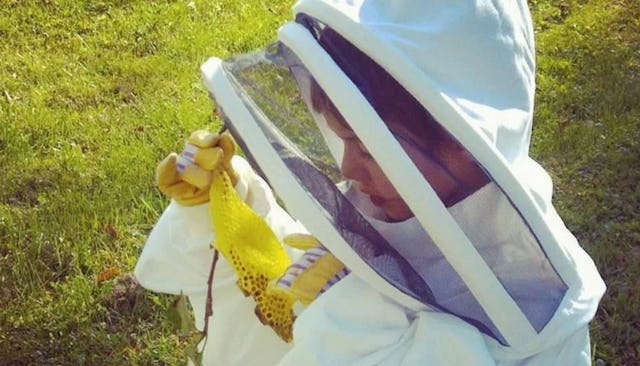We Must Get Serious About Protecting Bees NOW

When my son was 4, he saved a wild swarm of bees.
It was a warm summer day, and we had been playing outside when my son noticed that the apple tree looked “fuzzy.” I followed his pointed finger and nearly had a panic attack when I saw what looked like a basketball sized swarm of buzzing bees congregating on a branch.
My heart seized in fear. Was anyone allergic to bee stings? Were those bees going to swoop down and sting us all? Who the hell do we call for something like this?
As it turns out, our town has a Bee Whisperer — for real. His name is Peter Cowan, and he is widely known in Maine for swooping in to save wild swarms of bees and calming the fears of parents like me.
I called the Bee Whisperer, and he came right over. In his trunk, he pulled out a bunch of equipment, including two white suits, one child-sized and one adult. He handed them to me, and to my absolute astonishment, my son, and I got to dress up and take part in rescuing these cooler than cool little creatures.
Courtesy of Housewife Plus
As we approached the swarm, the Bee Whisperer chatted my son up. He told him all about how cool bees are and explained to my kiddo that these bees — these magical little creatures that are responsible for our food supply — are not harmful at all. Through the whirlwind experience of actually touching a swarm and listening intently to this strange man in a white suit, my kid learned some profoundly important lessons.
Bees pollinate plants more efficiently than any other insect. They are so great at what they do that farmers pay to have bees shipped to their farms in order to pollinate fields of crops. Those almonds and pumpkins, blueberries and potatoes you love so much? You can thank bees.
According to the Natural Resources Defense Council, bees help us produce more than $15 billion in crops each year, and honey bees produce more than $150 million in honey a year. That is a huge part of the food economy.
But with bees being threatened because of colony collapse disorder, “the global economic cost
of bee decline, including lower crop yields and increased production costs has been estimated at as high as $5.7 billion per year.” This means that all those lovely almonds and berries, fruits and vegetables that we love so much are becoming more expensive to grow and harder to get.
So what is colony collapse disorder, and how can your family help?
It is a nasty disorder that causes bees to abandon their hives and die in massive numbers. The science community has identified several causes including pesticide, herbicide, and fungicide use, global warming, habitat loss, and harmful parasites.
Since 2006, beekeepers, farmers, and researchers have been publicly vocal in trying to capture attention on this growing and serious problem. It is so bad that the NRDC has estimated that one-third of all honey bees in the U.S. have vanished, and not only that, but bee populations are the lowest on record in more than 50 years. This is scary shit, folks.
So what can you do?
Buy local honey from farmers and beekeepers with safe practices such as avoiding pesticide use.
Support your local farmers: frequent farmer’s markets, locally owned produce stands, and talk to farmers directly.
Support research by helping to fund the EPA and smaller satellite organizations that have a laser-focus on saving bee populations. You can report bee kills and suspected pesticide problems to National Pesticide Information Center or by emailing beekill@epa.gov.
And if you see anything like a fuzzy branch and you suspect that you have a wild swarm that needs saving? Call your local bee whisperer. You can find out if you have one in your community by going to the American Beekeeping Federation.
Plant wildflowers in your yard. Bees love wildflowers, and this is a fun, easy, affordable project for the whole family. When bumble bees live near areas with an assortment of wildflowers, their survival rate into the next year increases up to four times. That’s huge.
If my 4-year-old can help save a wild swarm of bees with his own hands, the rest of us can at least educate ourselves on the unique and important role that bees play in our food chain. We need to share this information with our kids. We need to do what we can to help bring back the bees, and we need to start now.
This article was originally published on